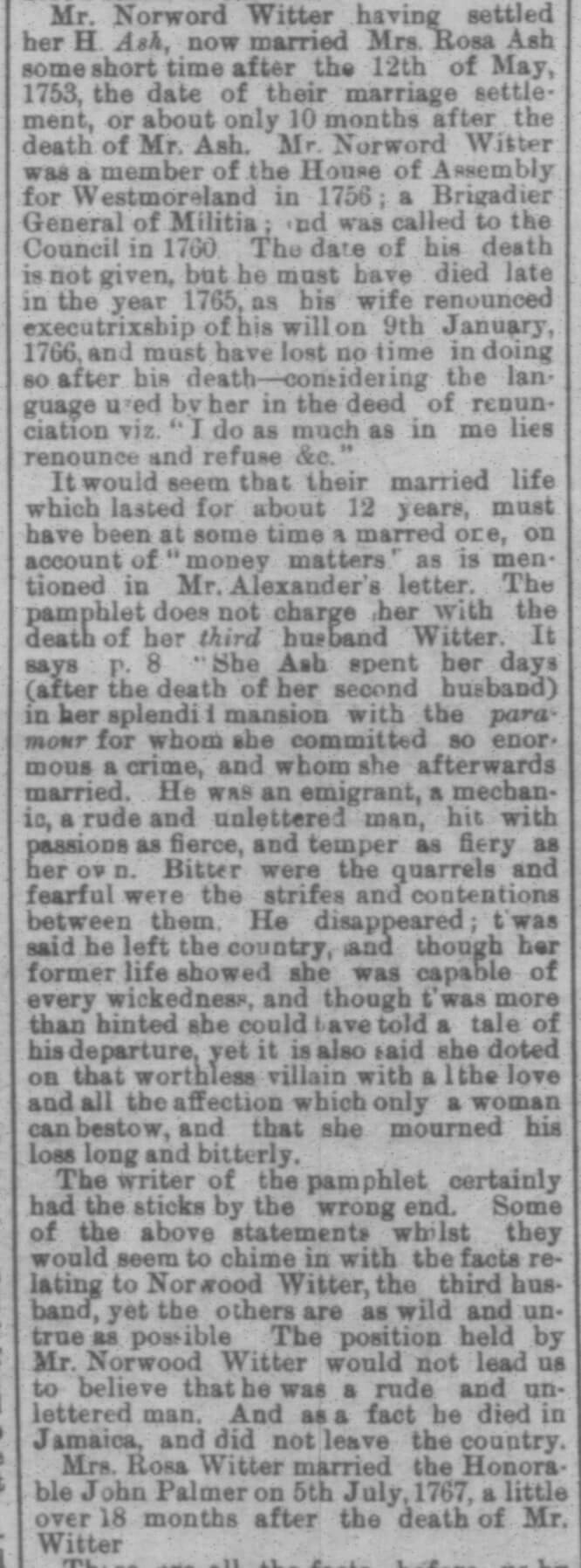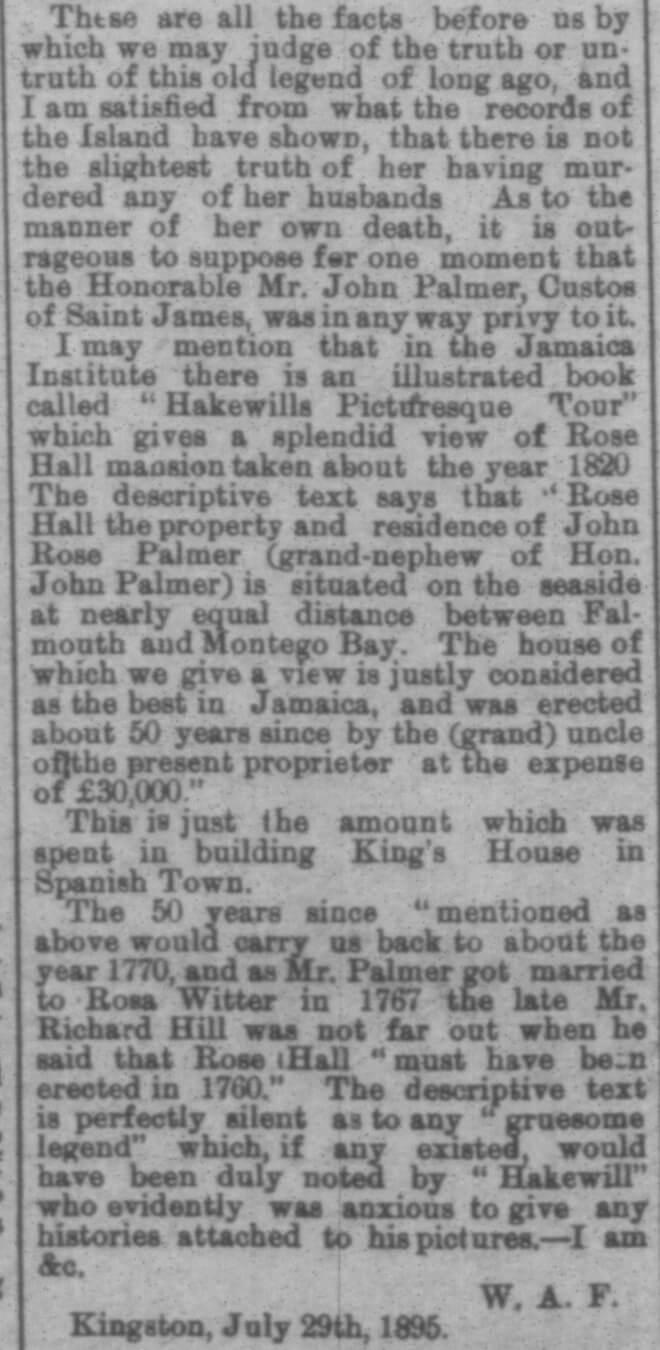

Continutinuation of the 1895 letters to the Kingston Daily Gleaner about the origins of White Witch of Rose Hall.
The Kingston Daily Gleaner published a letter in 1895 that sparked a controversy over the story and identity of the White Witch of Rose Hall. This public debate went on for several months through the publication of several letters to the Gleaner, catching the attention and interest of the general public and ultimately shaping it into the story we now know.
Kingston-Gleaner-July 31-1895-p-7
Mrs. Rosa Palmer.
LETTER TO A FRIEND.--No. 3.
Since writing my second letter, two very important and interesting letters have appeared in the popular columns of the GLEANER one by Mr. E. N. MacLaughlin, and the other by Mr. Leslie Alexander, which throw considerable light on this subject. You wil remember that in my second letter I threw out the hint that the Records might be consulted in order to find out whether Mrs. Rosa Palmer (the monument lady) was really thrice married before she became the wife of Mr. John Palmer
Although Mr. MacLanghlin in his letter gave the register of Mrs. Rosa Palmer's marriage, with the Honble John Palmer in 1767, yet it was silent as to whether she was a spinster, or a widow, and I wrote to him stating that the absence of this information was a fatal omission as it still left her under a cloud, and it was necessary that further searches should be made for deeds of settlement, &c., by which the necessary information might be gained. Mr. Alexander's valuable letter now supplies all the material facts that are necessary to elucidate the point.
It is now shown that Mrs. Rosa Palmer was married four times, and although this fact would lend colour to the legend, yet it does not by any means follow that this lady was guilty of the terrible crimes laid to her charge.
From Mr. Alexander's letter giving extracts from the Records I gather the following:
1. Mrs. Rosa Palmer (the monument lady who I am dealing with exclusively) was a daughter of Rector Kelly of St. Elizabeth.
2. She married Henry Fanning on 16th July, 1746, who it is supposed owned the land forming Rose Hall estate, and which were then or at some time after named Rose Hall.
3. Henry Fanning died 28th January, 1747, a little more than 6 months after his marriage. "His will was dated only 2 days before his death and he therein bequeathed to his dearest and best beloved wife Rosa Fanning" all his estate, &c. Mark you, this was only 2 days before he died. Why then should it be said that his wife was the cause of his death? The pamphlet states that the first husband died of poison administered by his wife, during his illness.
4 Her next husband was George Ash of St. James, planter. No date of their marriage is given, but Mr. Ash's will which is dated 15th July, 1752, gives the residue of his estate to his "dearly be loved wife Rosa Ash in fee." Mr. Ash must have died shortly after the date of his will because Rosa Ash became the wife of Norwood Witter about the 12th of May, 1753, which is the date of the marriage settlement made between Rosa Ash and Norwood Witter. The pamphlet tells us that Mrs. Rosa Ash stabbed her second husband on his dying bed having previously poisoned him (and here comes in the story more like a lie) of the blood stains on the floor.

Mr. Norword Witter having settled her H. Ash, now married Mrs. Rosa Ash some short time after the 12th of May, 1753, the date of their marriage settlement, or about only 10 months after the death of Mr. Ash. Mr. Norword Witter was a member of the House of Assembly for Westmoreland in 1756; a Brigadier General of Militia; and was called to the Council in 1760. The date of his death is not given, but he must have died late in the year 1765, as his wife renounced executrixship of his will on 9th January, 1766, and must have lost no time in doing so after his death -- considering the language used by her in the deed of renunciation viz. "I do as much as in me lies renounce and refuse &c."
It would seem that their married life which lasted for about 12 years, must have been at some time a marred one, on account of money matters as is mentioned in Mr. Alexander's letter. The pamphlet does not charge her with the death of her third husband Witter. It says P. 8 "She Ash spent her days (after the death of her second husband) in her splendid mansion with the paramour for whom she committed so enormous a crime, and whom she afterwards married. He was an emigrant, a mechanic, a rude and unlettered man, hit with passions as fierce, and temper as fiery as her own. Bitter were the quarrels and fearful were the strifes and contentions between them. He disappeared; t'was said he left the country, and though her former life showed she was capable of every wickedness, and though t'was more than hinted she could have told a tale of his departure, yet it is also said she doted on that worthless villain with all the love and all the affection which only a woman can bestow, and that she mourned his loss long and bitterly.
The writer of the pamphlet certainly had the sticks by the wrong end. Some of the above statements whilst they would seem to chime in with the facts relating to Norwood Witter, the third husband, yet the others are as wild and untrue as possible The position held by Mr. Norwood Witter would not lead us to believe that he was a rude and un lettered man. And as a fact he died in Jamaica, and did not leave the country. Mrs. Rosa Witter married the Honorable John Palmer on 5th July, 1767, a little over 18 months after the death of Mr. Witter.

These are all the facts before us by which we may judge of the truth or untruth of this old legend of long ago, and I am satisfied from what the records of the Island have shown, that there is not the slightest truth of her having murdered any of her husbands. As to the manner of her own death, it is outrageous to suppose for one moment that the Honorable Mr. John Palmer, Custos of Saint James, was in any way privy to it. I may mention that in the Jamaica Institute there is an illustrated book called "Hakewills Picturesque Tour" which gives a splendid view of Rose Hall mansion taken about the year 1820. The descriptive text says that "Rose Hall the property and residence of John Rose Palmer (grand-nephew of Hon. John Palmer) is situated on the seaside at nearly equal distance between Falmouth and Montego Bay. The house of which we give a view is justly considered as the best in Jamaica, and was erected about 50 years since by the (grand) uncle of the present proprietor at the expense of £30,000."
This is just the amount which was spent in building King's House in Spanish Town.
The 50 years since "mentioned as above would carry us back to about the year 1770, and as Mr. Palmer got married to Rosa Witter in 1767 the late Mr. Richard Hill was not far out when he said that Rose Hall must have been erected in 1760." The descriptive text is perfectly silent as to any gruesome legend" which, if any existed, would have been duly noted by "Hakewill" who evidently was anxious to give any histories attached to his pictures.-I am &c.
W, A. F.
Kingston, July 29th, 1895.
